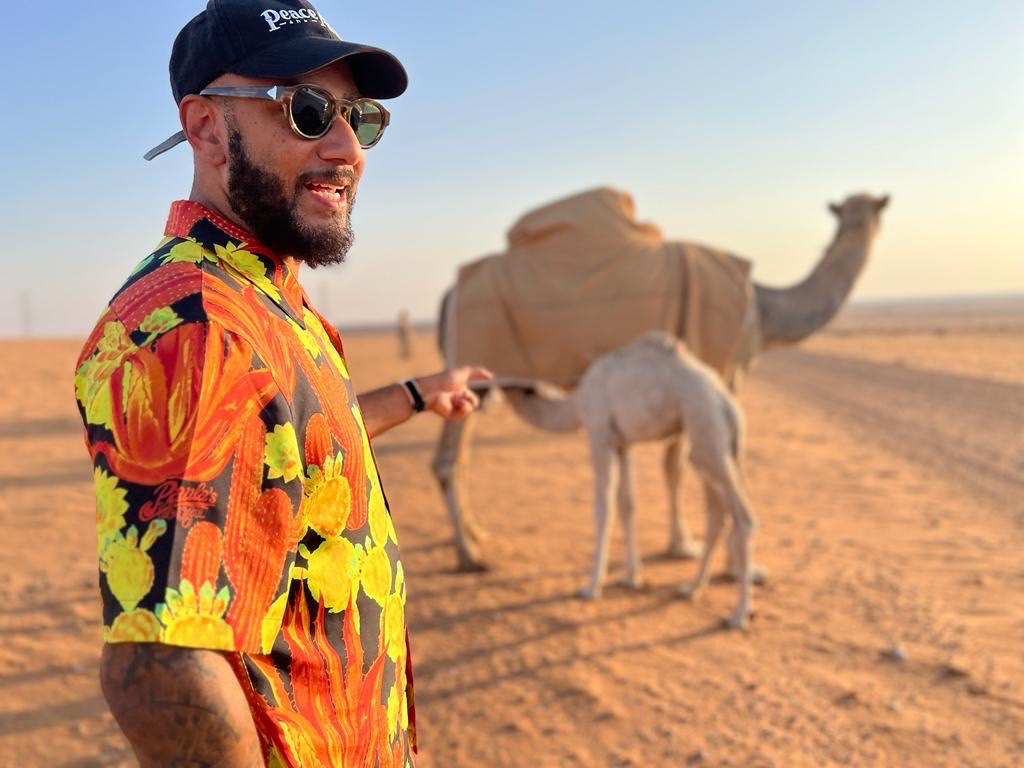DHAHRAN: As the first AlUla Camel Cup launches on March 14, a familiar face will be seen among the spectators — Grammy award-winning producer Swizz Beatz and his American-owned camel racing team, Saudi Bronx.
Camel racing has a long history in Saudi Arabia and, in recent times, has become a prestigious pastime, drawing in a who’s who of international and local fans.
Arab News spoke with Kasseem Dean, better known as “Swizz Beatz,” exclusively for the occasion.
Q: The name Saudi Bronx — tell us what it feels like being from the Bronx and owning a camel racing team?
A: The feeling is incredible. Fusing both cultures through this brand makes it even more personal to me. Being from the Bronx, the first American to own a camel racing team and competing in my second home, Saudi is making history — I’m all about making history and stepping outside my comfort zone. Saudi Bronx is an energy I want people to feel regardless of where they’re from. You can see people all over the world in Saudi Bronx merch, representing the brand, showing love to Saudi, the Bronx and the sport of camel racing. It’s a testament to the power of crossing cultures, from the Bronx to Saudi and all over the world.
Q: What drew you into camel racing?
A: It was very natural to me. My close friends are very passionate about the sport. On many of my visits we would watch the camels train and race early in the morning; the energy, tradition and history behind the sport and the camel itself are what drew me in. I knew I had to be part of it and let the world know about it. This will be my fourth year as owner of a camel racing team, and I’m looking forward to many more where we can hopefully take this sport global.

Camel racing has a long history in Saudi Arabia and, in recent times, has become a prestigious pastime. (Supplied)
Q: Why Is this race so special? What shall we expect from Saudi Bronx there?
A: The AlUla Camel Cup is very special. AlUla is one of my and my family’s favorite places in Saudi, and now I’m having my camel family, all of whom are named after my loved ones, race in the biggest Camel Cup in history. We’re going to race, but we’re also going to showcase the Saudi Bronx brand for the first time ever. Inviting visitors, the local community of AlUla and fellow camel racing members into the world of Saudi Bronx is what makes this particular race different.

Grammy award-winning producer Swizz Beatz has an American-owned camel racing team, Saudi Bronx. (Supplied)
Q: We hear you have a special bond with your camel racing trainer, Hamed. Can you tell us more about that?
A: One thing that makes this sport different is the familial aspect to it. Most of the people behind the wins and awards are families who understand camels and the sport more than anyone. These families breed, train, caretake and live by the camels during races, it’s almost a part of their DNA. It’s so rare to see that closeness to tradition and nature in the world we live in today; that’s something I deeply admire about my trainer. I’ve been super blessed with my camel racing trainer, Hamed and his beautiful family that I share the same love and respect for as I do my own. Hamed is the key driver behind many of our wins and the growth of Saudi Bronx over the past few years. We’ve met each other’s families, had dinner at our homes, and are always connected on and off camel racing season.

The first AlUla Camel Cup launches on March 14. (Supplied)
Q: What does the future hold for Saudi Bronx?
A: The Saudi Bronx universe. We’re creating experiential touchpoints through music, fashion, art, film and activations that people from all the world can dive into. Saudi Bronx is a representation of fusing cultures, something everyone can relate to; we intend to grow that in future.














